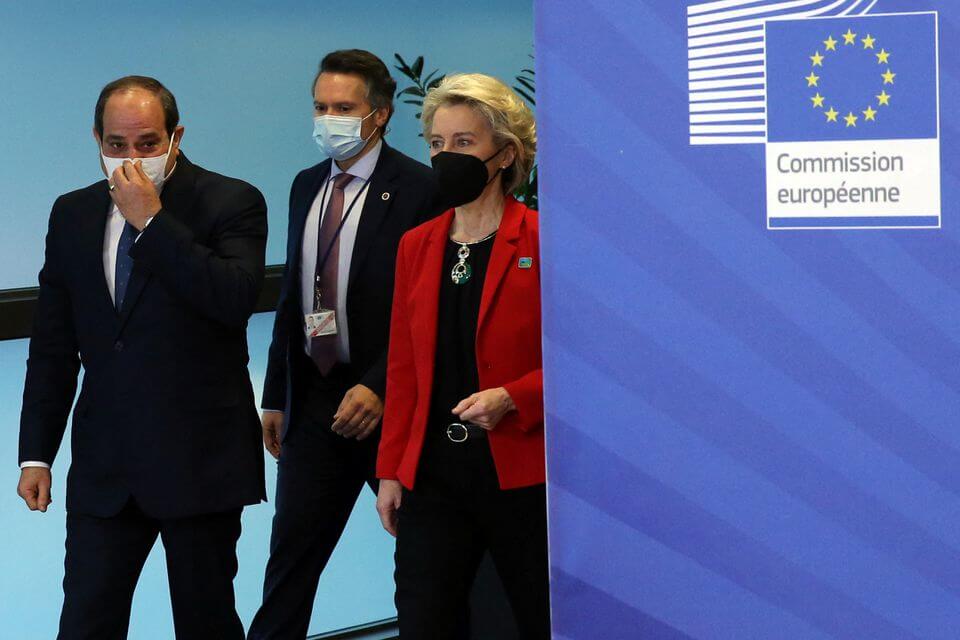On Thursday, the European Union (EU) hosted more than 40 African leaders in Brussels as part of the 6th EU-African Union (AU) summit. The two-day summit is an effort by European countries to redouble their economic, strategic, and diplomatic cooperation with the continent amid rising Chinese and Russian influence.
In her opening speech, European Commission President Ursula von der Leyen said that the summit is the “perfect opportunity to discuss how we are going to work together, how we are making our joint ambitions a reality.” She stressed the importance of the EU’s Global Gateway Strategy in investing in infrastructure and people.
Today we launch the first #GlobalGateway investment package for Africa.
— Ursula von der Leyen (@vonderleyen) February 17, 2022
Quality infrastructure driven by values and implemented in full transparency and partnership.
It will show Europe's power to attract unprecedented levels of investment - public and private. pic.twitter.com/MYrlqrS0r9
The Global Gateway, she said, offers a value-based and transparent approach to investment, before adding that it will “muster Europe’s power to unlock unprecedented levels of investment, not only public but also private capital.”
Von der Leyen also announced that the EU will provide Africa with $170 billion to be used for projects ranging from infrastructure development, education, climate change, and vaccine production, to sustainable development over the next seven years. The package is part of the Global Gateway Strategy.
She specifically said that the package would be used to “catalyse investments” in renewable energy projects, transportation corridors like roads and railways, and health with a focus on vaccine development. Noting that the aim of Global Gateway is to “turn our vision [for Africa] into a reality” and said that the vision would only be realised if European and African countries worked together.
“Today’s Summit is our first milestone. I cherish the vision of two continents working hand in hand to improve the world we live in,” von der Leyen concluded.
The Global Gateway has been touted as a competitor to China’s flagship Belt and Road Initiative (BRI), which has thus far enlisted 43 of 55 African countries as partners. Under the BRI, China has built a network of infrastructure projects worth billions of dollars. However, it has faced accusations of practising debt-trap diplomacy, wherein partnered states have been forced to surrender control of key industries owing to their inability to pay back exorbitant loans.
Our two unions beat with the same heart. And we would like them to speak with a single voice as well.
— Charles Michel (@eucopresident) February 17, 2022
If we join forces, our two continents will contribute to making the world fairer, more stable, more resilient and more sustainable. @_AfricanUnion #EUAUsummit pic.twitter.com/5cRpREaVDP
“We see Africa as a dynamic continent. A power of the 21st century, a natural and privileged partner of Europe,” European Council President Charles Michel said during his speech. Michel noted that the summit aimed to draw together a “common space of prosperity stability, and security.”
“We see the absolute necessity of a stable, secure and prosperous Africa. For Africans. But also for Europeans. There will be no stable world, no secure Europe, without a stable, secure and prosperous Africa,” stated. Furthermore, Michel stressed that security in Africa and Europe are “interdependent” and added that “instability, governance failures and coups jeopardize development. And create risks.”
“African problems require African solutions, designed by Africans […] We Europeans are ready and determined to work with you towards a more resilient security architecture,” he emphasised.
On Thursday, African and European countries met in Paris to discuss European security cooperation in the Sahel region, especially in Mali. During the meeting, France announced that it would be withdrawing French troops from Mali, deployed as part of Operation Barkhane and Takuba missions to combat Islamist insurgents, over the next four to six months.
France’s move coincides with the Malian junta’s decision to allow Russian mercenaries of the Wagner Group to be deployed in the country. The Wagner Group has been deploying mercenaries to several African countries, including the Central African Republic, Libya, Madagascar, Mozambique, and Sudan. Regional governments have offered the group money and lucrative deals to extract their country’s natural resources in return for help in combating local insurgencies.
Both the EU and the United States have been opposed the presence of Russian mercenaries in Mali. France has condemned the deployment of Wagner troops in the country and said that the presence of private mercenaries in the country will lead to regional instability.
Against this backdrop, Michel said on Thursday that AU-EU Summit provides an opportunity for both continents to reflect on how they have tacked the situation in the Sahel so far and also explore new opportunities.
At the 6th #AUEUSummit, I called for a joint reflection of the strategic #AUEU partnership with pragmatic, concrete action coupled with innovative approaches to deliver on our shared objectives of fair global governance, shared prosperity & equitable access to opportunity. pic.twitter.com/5do9byjwoL
— Moussa Faki Mahamat (@AUC_MoussaFaki) February 17, 2022
AU Chairman Moussa Faki Mahamat welcomed the initiatives adopted as part of the Summit and praised greater European involvement in Africa. Nevertheless, he said that concrete action is needed to ensure that the vision of the Summit is fulfilled.
In this respect, Mahamat called on participants to focus on “financing mechanisms” as well as “monitoring and evaluation” to ensure that projects are being carried out meaningfully.
“As the traditional mechanisms have clearly shown their limits, our two Unions are called upon to invent new ones that are more flexible, more efficient and more productive of results,” he remarked, adding, “Above all, they will have to cooperate more effectively in the fight against illicit financial flows and repatriate the funds resulting from such flows to Africa.”
The Summit will continue on Friday; leaders are expected to discuss in greater detail cooperation on issues like agriculture and sustainable development, education, private sector support, governance, and climate change and energy transition.

